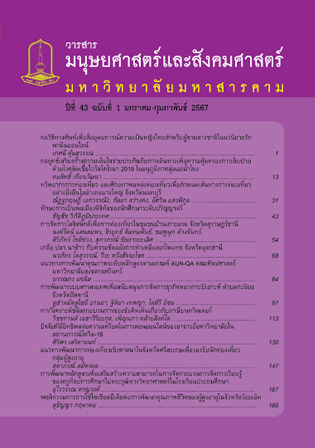ปัจจัยที่มีอิทธิพลต่อความเครียดในการสอนออนไลน์ของอาจารย์มหาวิทยาลัยในสถานการณ์โควิด-19
Main Article Content
บทคัดย่อ
การวิจัยนี้มีวัตถุประสงค์เพื่อ 1) ศึกษาปัจจัยที่ส่งผลต่อความเครียดในการสอนออนไลน์ของ อาจารย์มหาวิทยาลัยในสถานการณ์โควิด-19 2) วิเคราะห์ความสัมพันธ์ของปัจจัยที่ส่งผลต่อความเครียด จากการสอนออนไลน์ของอาจารย์มหาวิทยาลัยในสถานการณ์โควิด-19 และ 3) ศึกษาปัจจัยที่ร่วมกัน พยากรณ์ตัวแปรตามความเครียดในการสอนออนไลน์ของอาจารย์มหาวิทยาลัยในสถานการณ์โควิด-19 กลุ่มตัวอย่างเป็นอาจารย์มหาวิทยาลัย จำานวน 404 คน ได้มาจากการสุ่มแบบไม่อาศัยความน่าจะเป็น แบบเจาะจง ใช้แบบสอบถามเป็นเครื่องมือ สถิติบรรยายที่ใช้คือ ความถี่ ร้อยละ ค่าเฉลี่ย และส่วนเบี่ยงเบน มาตรฐาน สถิติอนุมานใช้การวิเคราะห์ความสัมพันธ์ระหว่างตัวแปรโดยพิจารณาค่าสัมประสิทธิ์ สหสัมพันธ์ของ Pearson และวิเคราะห์สมการถดถอยเชิงเส้นพหุคูณ แบบขั้นตอนในการทดสอบอิทธิพล ระหว่างกลุ่มตัวแปรต้นและตัวแปรตาม รวมทั้งอำนาจพยากรณ์ความเครียดในการสอนออนไลน์ของ อาจารย์ ผลการวิจัยพบว่า 1) ค่าเฉลี่ยของปัจจัยที่ส่งผลต่อความเครียดในการสอนออนไลน์ของอาจารย์ เป็นรายด้าน พบว่าอยู่ในระดับมาก 2 ด้าน ได้แก่การรับรู้ความสามารถตนเอง และทัศนคติที่มีต่อ เทคโนโลยีการสอนออนไลน์ ในระดับค่อนข้างมากมี 3 ด้าน ได้แก่กลยุทธ์การรับมือกับความเครียด ความเครียดในการสอนออนไลน์ และความเครียดจากการใช้เทคโนโลยีการสอนออนไลน์ สำหรับด้าน ที่มีค่าเฉลี่ยน้อยได้แก่ ความเหนื่อยล้าทางอารมณ์ 2) ปัจจัยที่ส่งผลต่อความเครียดในการสอนออนไลน์ ของอาจารย์ประกอบไปด้วยความเหนื่อยล้าทางอารมณ์ การรับรู้ความสามารถตนเอง ความเครียดจาก การใช้เทคโนโลยีการสอนออนไลน์ ทัศนคติที่มีต่อเทคโนโลยีการสอนออนไลน์ ความเครียดในการสอน ออนไลน์ของอาจารย์ และการรับมือกับความเครียด มีความสัมพันธ์กันในเชิงบวก โดยที่ความเครียด จากการใช้เทคโนโลยีการสอนออนไลน์ มีความสัมพันธ์ทางบวกกับความเครียดในการสอนออนไลน์ มากที่สุด 3) ความสัมพันธ์ของปัจจัยความเหนื่อยล้าทางอารมณ์ และความเครียดในการใช้เทคโนโลย การสอนออนไลน์ร่วมกันพยากรณ์ความเครียดในการสอนออนไลน์ของอาจารย์ได้มากที่สุดอย่างมี นัยสำคัญทางสถิติ (Sig<.05) ร้อยละ 44.6
Article Details
เอกสารอ้างอิง
กัลยา วานิชย์บัญชา. (2544). หลักสถิติ (พิมพ์ครั้งที่ 6). โรงพิมพ์แห่งจุฬาลงกรณ์มหาวิทยาลัย.
เจริญ ภูวิจิตร์. (2564). การจัดการเรียนรู้ทางออนไลน์อย่างมีประสิทธิภาพในยุคดิจิทัล http://www.nidtep.go.th/2017/publish/doc/20210827.pdf
นพพงษ์ เกิดเงิน, สุธาทิพย์ กำ ธรพิพัฒนกุล, นรินทร สมทอง.(2564). ปัจจัยการยอมรับนวัตกรรมที่ส่งผลต่อความตั้งใจในการสั่งซื้ออาหารแบบออนไลน์เดลิเวอรี่
ของผู้ใช้บริการในประเทศไทย.วารสารบริหารธุรกิจ มหาวิทยาลัยแม่โจ้, 3(2), 1-19. https://doi.org/10.14456/mjba.2021.6
ปิยะวดี สุมาลัย. (2564). ภาวะหมดไฟในการทำ งานของพยาบาลวิชาชีพ สถาบันบำ ราศนราดูร. วารสารวิทยาลัยพยาบาลพระจอมเกล้า จังหวัดเพชรบุรี, 4(2),
-78.
เปรมภาว์ ด้วงทอง, วรสันต์ ถาวรประเสริฐ, วิจิตรา ธนะศิริขจร และวิษณุพงษ์ โพธิพิรุฬห์. (2564).ความเครียดจากการใช้เทคโนโลยีในการจัดการเรียนการสอน
ออนไลน์ของอาจารย์มหาวิทยาลัยราชภัฏสงขลาในช่วงการระบาดของโรคโควิด-19: การตรวจสอบตัวแปรทำนายและผลลัพธ์. Thai J SciTechnol, 49-73.
ฐิตินันทน์ ผิวนิล. (2562). ความรู้และทัศนคติ ตลอดจนความสัมพันธ์ที่มีต่อการใช้เครือข่ายสังคมออนไลน์เพื่อการเรียนการสอนของครูในโรงเรียนสังกัด
กรุงเทพมหานคร. วารสารมนุษยสังคมปริทัศน์(มสป.), 21(1), 130-146.
Ahmet Cezmi Savas, Yunus Bozgeyik and Ismail Eser. (2014). A Study on the Relationshipbetween Teacher Self Efficacy and Burnout.
EUROPEAN JOURNAL OF EDUCATIONAL RESEARCH, 3(4), 159-166.
Bandura, A. (1986). The explanatory and predictive scope of self-efficacy theory. Journal of Social and Clinical Psychology, 4(3), 359-373.
Best, J. W. (1977). Research in education (3rd ed). Prentice-Hall Inc.
Christopher, B., Califf, & Brooks, S. (2020). An empirical study of techno-stressors, literacy facilitation, burnout, and turnover intention
as experienced by K-12 teachers. Computers & Education, 157(2020), 103971.
Lazarus, R.S., & Folkman, S. (1984). Stress, appraisaland coping. Springer.
Mosleh, S.M., Kasasbeha, M.A., & Aljawarneh, Y.M. (2022). The impact of online teaching on stress and burnout of academics during the
transition to remote teaching from home.
BMC Med Educ, 22, 475. https://doi.org/10.1186/s12909-022-03496-3
Rogers, E.M. (1995). Diffusion of innovations (4th Edition). Free Press.
Rogers, E.M. (2003). Diffusion of innovations (5th edition). Free Press.
Seritanondh, S. (2022). Leadership style and stress coping methods among institutional administratorsin the situation of the COVID-19
pandemic. Western University Research Journal of Humanities and Social Science, 8(1), 283-298.


